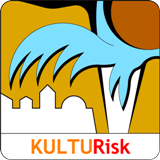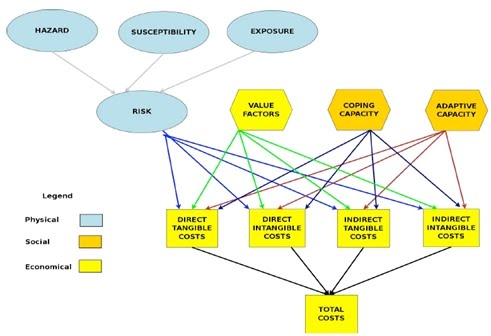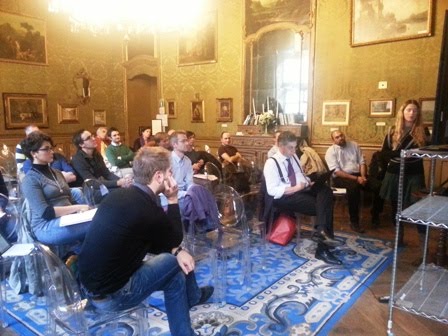Messages
Evaluating the benefits of risk prevention
|
The KULTURISK project developed a comprehensive assessment methodology of the tangible and intangible values (e.g. cultural heritage) involved in risk evaluation, proposing three key innovations: to include social capacities of reducing risk, to go beyond the estimation of direct tangible costs, and to provide an operational solution to assess risks, impacts and benefits of risk reduction measures (presented by: Pierpaolo Campostrini at the Global Platform for Disaster Risk Reduction, Geneva, Switzerland, May 2013)
|
Educational material in flood modelling
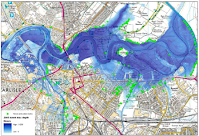
Material is available to download at the School of Geographical Sciences
|
Presentations of the 3rd KULTURisk workshop
|
We are happy to announce that the presentations given at the 3rd KULTURisk workshop are available online.
|
KULTURisk project at the OECD High Level Risk Forum
|
On 12 September 2013 the insights of the KULTURisk project was presented at the Introductory Session of the Expert Meeting on Risk Prevention and Mitigation: Governing Effective Prevention and Mitigation of Disruptive Shocks, held at the OECD Conference Centre in Paris. After a welcoming address by Mr. Mario Marcel, deputy director of Public Governance and Territorial Development Directorate of the OECD, and an overview of the objectives of the expert meeting by Cathérine Gamper (PGTDD), Leonardo Alfonso, co-Manager of the KULTURisk Project, made the kick-off presentation entitled: "Why prevention pays", which formally opened the discussion sessions. These discussions included the topics of risk prevention and mitigation in times of fiscal constraints, engagement of the private sector in risk prevention and mitigation, the roles of sub-national governments in risk prevention and mitigation as well as the role of international collaboration. The expert meeting lasted two days and counted with the participation of 21 expert panelist from the OECD members.
|
3rd KULTURisk workshop, registration open
|
Final Information: Agenda and How to get
We are pleased to announce the 3rd KULTURisk workshop entitled 'Benefits of disaster prevention measures: consolidating and widening an innovative risk assessment methodology', which will be held in Venice, Italy, on 19-20 September 2013.
Aim of the workshop
Effective strategies and plans of Disaster Risk Reduction are built on a good understanding about the risks a community is facing. This understanding can only be achieved through a Risk Assessments methodology that considers the multi-faceted physical/environmental, social and economic aspects. The KULTURisk project aims at supporting the spreading of a culture of prevention, by offering the
possibility to evaluate the actual economic, environmental, cultural and social benefits of different risk reduction measures. This evaluation is carried out with the use of a comprehensive risk assessment methodology. The KULTURisk methodology has been developed and validated on water-related hazards (i.e. floods, debris flows and landslides, storm surges), in different European case studies and with different receptors/elements at risk (i.e. people, economic activities, cultural heritage, natural and semi-natural systems). One objective of the project is to generalize this methodology and explore the applicability of the KULTURisk approach to different types of natural hazards, like earthquakes, forest fires, etc. The aim of the two days workshop is to present the Risk Assessment methodology developed by KULTURisk and to discuss it with the main national and European stakeholders and experts of different natural hazards.
The workshop will be articulated into three main sessions:
1. Towards a new culture of prevention: from international DRR strategies to local implementation
2. KULTURisk methodology for assessing the benefits of prevention measures
3. From water-related hazards to other natural hazards
The final programme will be available soon in: http://www.kulturisk.eu/
The event is open to both members and non members of the projects. The participation is free, after
registration approval. Deadline for the registration is the 2nd Sept 2013.
Registration link: http://www.registration.corila.it/formregister.asp?IdConferenza=C000044
For further information : [email protected]
|
KULTURisk at the Global Platform for disaster Risk Reduction
|
The Global Platform for Disaster Reduction is a biennial forum for information exchange, discussion and partnership building across sectors, to improve implementation of disaster risk reduction. This year it will be held in Geneva, Switzerland on 19-23 May 2013. Pierpaolo Campostrini, managing Director of CORILA, will introduce the methodology developed within the KULTURisk project. Click here for more information.
|
KULTURisk SUMMER SCHOOL - Flood risk reduction: perception, communication, governance
|
9-12 September 2013 at UNESCO-IHE Institute for Water Education, Delft The Netherlands
This Summer School will introduce various approaches to risk prevention and management and highlight the importance of measures, risk perception and communication to risk governance and the existing international initiatives and policies in disaster risk reduction. These concepts will be analysed in the context of water-related hazards such as floods and landslides occurring in coastal areas, mountainous catchments, transboundary large rivers and urban settings, with the understanding that given the multi-hazard approach required in disaster risk reduction, they may be applicable to other natural hazards.
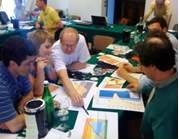
Learning objectives
Upon completion of the summer school, the participants will be able to:
The course is designed for current and future water managers, decision-makers and others involved in the management of water-related disasters. Participants need to have a bachelor degree in a relevant subject (i.e. engineering, economics, and social sciences) and preferably several years of relevant working experience.
Course content
Lecturers
Prof. David Demeritt (King’s College, London)
Dr. Matthias Buchecker (Swiss Federal Research Institute, Zurich)
Dr. Sálvano Briceño (ICSU/IRDR, retired, UNISDR) Dr. Giuliano Di Baldassarre (UNESCO-IHE Institute for Water Education, Delft)
Registration Fee
Before (including) 30 May 2013: €200*
After 30 May 2013: €250*
Deadline for registration: 31st July 2013
*includes registration, material, lunch, coffee
Note: accommodation, transportation and other meals are not included
Payment methods
Application procedure
- Complete application form below
- Participants will be contacted and be informed about payment procedure
- Maximum number of places: 25
|
How to evaluate the benefits of risk prevention?
|
We are pleased to announce that the deliverable 1.6 - The KULTURisk Framework (KR-FWK) is now of public access. KR-FWK is a conceptual framework integrating different disciplines that provide the basis for the development of a methodology to comprehensively evaluate the benefits of risk prevention.
Two main innovations are proposed with regards to the state of the art: (1) to include the social capacities of reducing risk, and (2) to define a measure of risk that goes beyond the direct tangible costs.
This interesting report can be downloaded here.
|
Inspiring KULTURisk presentations at EGU Leonardo Conference
|
The KULTURisk project was directly involved in the co-organisation of the session "Governance of Water-related Risks". In addition, six oral presentations and eight poster presentations (related to KULTURisk) were made at the conference; available at (http://www.eguleonardo2012.polito.it/abstracts/presentations/)
Immediately after the conference, a KULTURisk progress meeting was held and the status of the case studies were presented. Furthermore, the KULTURisk risk assessment methodology was introduced and discussed.
|
1-10 of 21
